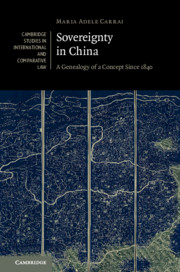Book contents
- Sovereignty in China
- Cambridge Studies in International and Comparative Law: 141
- Sovereignty in China
- Copyright page
- Dedication
- Contents
- Figures
- Acknowledgments
- Introduction
- 1 International Law and the Sinocentric Ritual System
- 2 Secularizing a Sacred Empire
- 3 China’s Struggle for Survival and the New Darwinist Conception of International Society (1895–1911)
- 4 China Rejoining the World and Its Fictional Sovereignty, 1912–1949
- 5 From Proletarian Revolution to Peaceful Coexistence
- 6 Historical Legacies, Globalization, and Chinese Sovereignty since 1989
- Conclusion
- Bibliography
- Index
- Cambridge Studies in International and Comparative Law
3 - China’s Struggle for Survival and the New Darwinist Conception of International Society (1895–1911)
Published online by Cambridge University Press: 26 July 2019
- Sovereignty in China
- Cambridge Studies in International and Comparative Law: 141
- Sovereignty in China
- Copyright page
- Dedication
- Contents
- Figures
- Acknowledgments
- Introduction
- 1 International Law and the Sinocentric Ritual System
- 2 Secularizing a Sacred Empire
- 3 China’s Struggle for Survival and the New Darwinist Conception of International Society (1895–1911)
- 4 China Rejoining the World and Its Fictional Sovereignty, 1912–1949
- 5 From Proletarian Revolution to Peaceful Coexistence
- 6 Historical Legacies, Globalization, and Chinese Sovereignty since 1989
- Conclusion
- Bibliography
- Index
- Cambridge Studies in International and Comparative Law
Summary
The two Opium Wars, the internal rebellions, the continuous encroachment of Western powers, and, in particular, the Qing-Meji War of 1894–1895 “forever changed China’s interpretation of herself in inter-state relations.” After the Qing-Meji War, Qing official Zhang Zhidong warned in his book China’s Only Hope that “in no period of China’s history has there arisen an emergency like the present,” and suggested the modern intercourse of nations as a means of Enlightenment. The principles of equality among nations, sovereignty, and international law became the framework within which Chinese intellectuals and diplomats articulated China’s subjectivity for the sake of strengthening its weak position in the international arena – and of its very survival. Qing claims to supreme authority were no longer sustainable, and having lost Korea, the last stronghold for the symbolic, fictional projection of its universal imperium, Qing intellectuals were forced to rethink China’s role in Asia and the world.
- Type
- Chapter
- Information
- Sovereignty in ChinaA Genealogy of a Concept since 1840, pp. 82 - 108Publisher: Cambridge University PressPrint publication year: 2019

